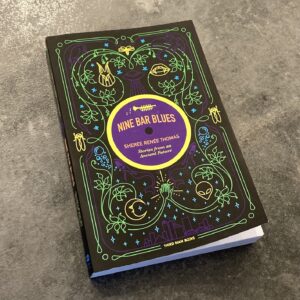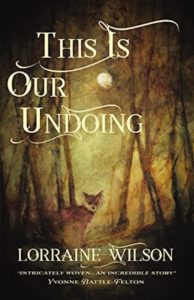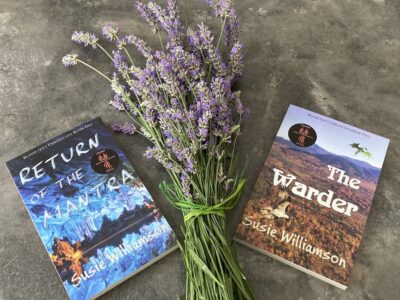
2023 so far has been filled with some magical reads. As writers we look for those layers to encapsulate and bring to life the essence of characters, cultures, worlds… and two titles stand out, for their intrinsic connection with music, that adds depth in a way that is difficult to define, because it’s as omnipresent as culture in stories masterfully woven.

Nine Bar Blues, by Sheree Renee Thomas
Nine Bar Blues is an extraordinary collection of evocative tales, rich, layered and textured with magic that haunts, uplifts and ascends any bounds of expectation. With prose that sings and muse that flies through the pages, I was hanging onto every word that guided me deeper into the authors layered imaginings and startling observations. From curse-bound sisterhood journeying to the source of ancestry, through poisoned landscapes of an other-worldly earth, to golden mermaids, tales are woven with musical renditions that move with the rhythm of cultural change, alive with the sounds of souls.
This is magic and fantasy rooted in the real; snapshots of life as sharp as cut glass that stop you in your tracks and make you lose your breath for a long pause. From contemporary social justice concerns, and words that carry the weight of history in finely-drawn prose, this collection speaks truth to the abuse of power, truths that sing to slave songs, lost souls, and the blues. An inspiring and masterfully woven collection.

Songspinners, by Sarah Ash
Orial works with her father, Dr Magelonne, in the Sanatorium of the spa city of Sulien. She is close to her father, more so since her mother, Iridial, died. Iridial had lived and breathed music, and now Dr Magelonne forbids music, since it provokes memories too painful to endure. But, like her mother, music flows from Orial like water. Only in the Undercity, at her mother’s shrine, can she practice the art that she has taught herself. But there she experiences strange visions in a waking dream – the searing pain of burning flames.
The underground labyrinth of the Undercity was built by ancient builders, the Lifhendil, commonly known as Songspinners in modern-day Sulien. Their artwork is still displayed on the Undercity’s walls, but their beliefs and language are lost, save for fairy stories and folk tale. This mysterious race possessed a unique trait – multi-coloured irises, which Orial and her mother shared. And as the world unfolds, revealing the depth of Orial’s gift, wonder, intrigue and danger merge.
In the Undercity, Orial is approached by refugees from Bel’Esstar, fleeing persecution from the Commanderie. One of the refugees, Amaru Khassian, is a composer, whose hands have been badly burned, injuries so severe, he won’t regain the use of his hands. A strange and unique connection exists between Orial and Khassian, one that makes clear to Orial that she simply must have music in her life, whilst for Khassian, a dangerous chain of events are triggered. Their personal music describes their uniqueness, and their contrasting and connected plights: Orial’s as darting and bright as a dragonfly’s flight; Khassian’s with despair and madness fuelled by ego.
This is an evocative, beautifully drawn world. I adored the magic, memorable, tangible, yet delightfully just beyond our reach, with tales of musical telepathy, faeries and dragonflies, and mystical reservoirs. Orial’s character was utterly captivating from the start, a thoughtful, determined, empathic young woman, and utterly intriguing in her magic as the story unfolds like an orchestral song. And as tensions run high in this complex world, the question remains, will Orial succumb to madness?
What are you reading?








